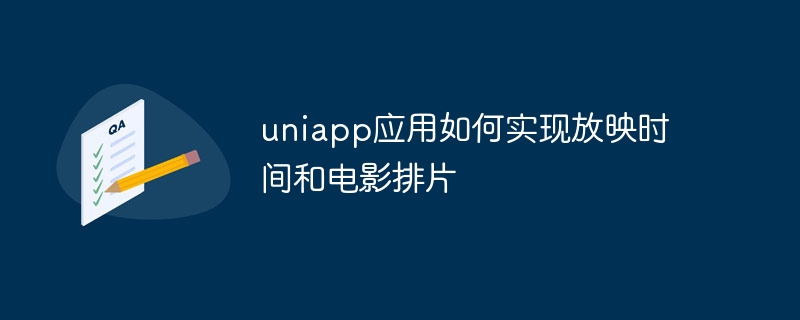

Title: Implementation of showtime and movie scheduling in Uniapp application and code examples
Introduction:
With the popularity of mobile applications, Uniapp has become a cross-platform The platform development framework provides developers with many convenient and practical functions. In the film industry, it is very important to accurately determine show times and film schedules. This article will introduce how to use the Uniapp application to implement show time management and movie scheduling functions, and provide relevant code examples.
1. Management of show time
The management of show time mainly involves creating a show schedule, displaying show time information, and operating on show time (adding, modifying, deleting, etc.).
Create a screening schedule
In the Uniapp application, you can use the Vue framework to create a screening schedule. The specific steps are as follows:
(1) Introduce Vue into the page and bind an array of screening schedules.
<script>
import Vue from 'vue';
export default {
data() {
return {
timetable: [
{ id: 1, time: '09:00' },
{ id: 2, time: '12:00' },
{ id: 3, time: '15:00' },
{ id: 4, time: '18:00' }
]
}
},
}
</script>(2) Use the v-for instruction on the page to display the show time information in a loop.
<template>
<div>
<ul>
<li v-for="item in timetable" :key="item.id">{{ item.time }}</li>
</ul>
</div>
</template>Through the above steps, you can create a simple screening schedule in the Uniapp application.
Operation show time
In the Uniapp application, you can operate the show time through event binding. For example, new showtimes can be added with the click of a button and the show schedule updated in real time.
<template>
<div>
<ul>
<li v-for="item in timetable" :key="item.id">{{ item.time }}</li>
</ul>
<button @click="addTime">添加放映时间</button>
</div>
</template>
<script>
import Vue from 'vue';
export default {
data() {
return {
timetable: [
{ id: 1, time: '09:00' },
{ id: 2, time: '12:00' },
{ id: 3, time: '15:00' },
{ id: 4, time: '18:00' }
]
}
},
methods: {
addTime() {
const newTime = { id: this.timetable.length + 1, time: '20:00' };
this.timetable.push(newTime);
},
}
}
</script>2. Implementation of the movie scheduling function
The movie scheduling function mainly provides administrators with movie scheduling management, including selecting theaters, selecting show times, selecting movies, etc. .
Select a theater
The function of selecting a theater can be realized through the picker component in Uniapp. The specific code examples are as follows:
<template>
<div>
<picker mode="selector" :range="{{ cinemas }}" @change="cinemaChange">
<view class="picker">
当前选择:{{ cinema }}
</view>
</picker>
</div>
</template>
<script>
export default {
data() {
return {
cinemas: ['影院A', '影院B', '影院C'],
cinema: '',
}
},
methods: {
cinemaChange(e) {
this.cinema = this.cinemas[e.detail.value];
},
}
}
</script>Select show time and movie
Uniapp provides picker component and radio component to implement the operation of selecting show time and movie. The specific code examples are as follows:
<template>
<div>
<picker mode="time" value="09:00" @change="timeChange">
<view class="picker">
当前选择放映时间:{{ time }}
</view>
</picker>
<radio-group @change="movieChange">
<label v-for="movie in movies" :key="movie.id">
<radio :value="movie.id">{{ movie.title }}</radio>
</label>
</radio-group>
<div>
</template>
<script>
export default {
data() {
return {
time: '',
movies: [
{ id: 1, title: '电影A' },
{ id: 2, title: '电影B' },
{ id: 3, title: '电影C' },
],
selectedMovie: '',
}
},
methods: {
timeChange(e) {
this.time = e.detail.value;
},
movieChange(e) {
this.selectedMovie = this.movies.find(movie => movie.id === e.detail.value);
},
}
}
</script>Conclusion:
This article uses the Uniapp application to implement the functions of show time management and movie scheduling. It uses code examples to demonstrate the creation of show schedules and presentations. Functions such as showtime information, operating showtimes, and selecting movies. Developers can combine Uniapp's relevant components and APIs to achieve more complex and flexible functions based on specific needs.
The above is the detailed content of How the uniapp application implements showtimes and movie scheduling. For more information, please follow other related articles on the PHP Chinese website!
 The difference between flutter and uniapp
The difference between flutter and uniapp
 After the computer is turned on, the monitor shows no signal
After the computer is turned on, the monitor shows no signal
 How to solve problems when parsing packages
How to solve problems when parsing packages
 js function function usage
js function function usage
 The difference between computer hibernation and sleep
The difference between computer hibernation and sleep
 How to add css style to html
How to add css style to html
 Permanently free oa system
Permanently free oa system
 Yiou Exchange app download
Yiou Exchange app download




